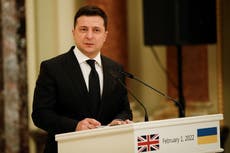US sanctions on Russia will ‘degrade their space programme,’ Biden says
Russia’s space programme director says country would ‘expand production of necessary devices at home’
New sanctions imposed by the US on Russia for invading Ukraine will affect the Russian space agency’s future programmes, US President Joe Biden said on Thursday.
Russia invaded Ukraine on Thursday and continues to carry out military attacks on multiple cities, including on capital Kyiv.
Since the onset of the attack, nearly 137 Ukrainians have been killed, according to the country’s president Volodymyr Zelensky.
Leaders around the world have condemned the conflict with the US announcing Thursday that it would impose new sanctions in response.
“Putin is the aggressor. Putin chose this war, and now he and this country will bear the consequences. Today, I’m authorising additional strong sanctions and new limitations on what can be exported to Russia,” Mr Biden said in a televised public statement.
The US has already announced several sanctions so far, including ones targeting Russian banks like SberBank and VTB, which are two major financial institutions that collectively control more than half of Russia’s banking assets, according to the US Treasury.
The White House has said sanctions and other economic penalties on Russia would continue to escalate if the crisis does not cease.
In effect, Mr Biden said the sanctions would cut off more than half of Russia’s high-tech imports, adding that the sanctions would “strike a blow to their ability to continue to modernise their military.”
“It’ll degrade their aerospace industry, including their space programme,” he added.
Mr Biden said the new sanctions are part of an international response against Russia’s invasion of Ukraine.
“We are building a coalition of partners representing well more than half the global economy, 27 members of the European Union including France, Germany, Italy, as well as the United Kingdom, Canada, Japan, Australia, New Zealand and many others to amplify the joint impact of our response,” he said.
Nasa said in a statement on Thursday that despite the war, the collaborative operations between it and Russian space agency Roscosmos would still go on, and that US astronauts and Russian cosmonauts would continue to safely conduct research operations in low-Earth orbit aboard the International Space Station (ISS).
Reacting to president Biden’s comments, Dmitry Rogozin, the director of Roscosmos, shared a long thread of comments on Twitter in the Russian language, saying Russia would “continue to make” its own spacecraft.
“And we will do them by expanding the production of the necessary components and devices at home,” he said.
“If you block cooperation with us, who will save the ISS from uncontrolled de-orbiting and falling into the United States or Europe? There is also the option of dropping a 500-ton structure to India and China. Do you want to threaten them with such a prospect? The ISS does not fly over Russia, so all the risks are yours. Are you ready for them?” Mr Rogozin added.
Russia’s space programme, which Mr Biden said would be affected by the sanctions, has several new missions planned for the near future, Space.com reported.
Roscosmos is building a new crew capsule called Orel – expected to be launched on Russia’s Angara rocket that is currently being tested. This capsule is being developed to dock with Nasa’s planned outpost in orbit around the moon.
The exact impact of the planned sanctions on Russian space missions and future Roscosmos collaborations remains unclear.
British prime minister Boris Johnson also said projects between the UK and Russia might be affected.
“Hitherto, I have been broadly in favour of continuing artistic and scientific collaboration, but in the current circumstances it’s hard to see how even those can continue as normal,” Mr Johnson said during a Parliament session.
Join our commenting forum
Join thought-provoking conversations, follow other Independent readers and see their replies
Comments


Bookmark popover
Removed from bookmarks